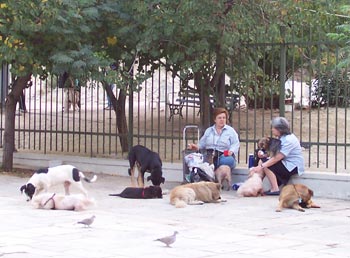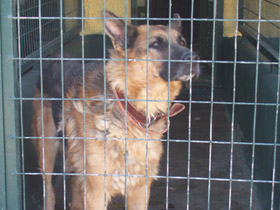Roaming the Ruins
Air Date: Week of November 21, 2003
Our guest host Bruce Gellerman was in Athens, Greece recently where he learned that efforts to rid the city of its huge stray dog population before the coming Olympic games may have taken a sinister turn.
Transcript
[SOUND OF CARS PASSING]
GELLERMAN: The traffic in Athens, Greece is awful. Forty percent of Greeks live in the capital city and there are just too many cars, scooters, trucks and motorcycles. The smog was the worst in Europe. But things are improving as Athens gears up to host next summer’s Olympics when a million tourists are expected to visit the country where the games started 27 hundred years ago.
There is a new subway system, an ultra-modern tramway and a six-lane beltway diverting traffic from the center of the city. But one problem remains on the streets of Athens as old as the Parthenon itself: dogs. All through history, Athens has literally gone to the dogs. They’re everywhere. Lianna Alexandri, director of the Hellenic Animal Welfare Society says packs of dogs roam the city’s ruins, restaurants, and roadways.
ALEXANDRI: I have heard tourists that come in Greece and many of them find stray dogs in Athens happy, or in Greece. But, of course, there are too many, they are not happy. They’re sick. They are badly treated. I think we cannot say we are very happy with the situation.
GELLERMAN: It’s estimated there are a half a million strays in Greece, 15 thousand strays in Athens alone. So while Athens mayor Dora Bakoyianni spends most of her time these days working on preparing the city for the Summer Olympics, her job includes the Herculean task of curbing the city’s population of abandoned dogs before the games begin. Recently, the mayor held an adopt-a-dog day at City Hall.
 (Photo: Bruce Gellerman)
(Photo: Bruce Gellerman)
BAKOYIANNI: People believe dogs are dolls so they buy them for the child and then they realize that it’s too much work and leave them stray. So there is new legislation now, if you buy a dog now it has an identity so we know after a while who was this wonderful parent who left it in the street.
GELLERMAN: Greek dog owners will now have to have microchip id tags imbedded under their pet’s skin. Those abandoning their dogs would face fines of a thousand euros. The new law also requires municipalities must round up strays and bring them to a shelter.
[SOUND OF BARKING DOGS]
 A stray sheltered by the Hellenic Animal Welfare Society.(Photo: Bruce Gellerman) A stray sheltered by the Hellenic Animal Welfare Society.(Photo: Bruce Gellerman) |
ALEXANDRI: These are the kennels for stray dogs.
GELLERMAN: At the Hellenic Animal Welfare Society’s shelter near Athens’ new international airport, there are a few cats and hundreds of dogs. Many are mutts, some have pedigrees says Society Director Lianna Alexandri. ALEXANDRI: There are all stray dogs and three are cats. We collect these dogs from the streets, from the roads. Almost before they come here, they’re dead. Some of them are really skeletons. They walk like skeletons, you see, because if they’re outside. You see, it’s a tremendous problem. GELLERMAN: Now, by law, stray dogs are captured, nursed back to health, neutered and returned to the streets they came from. Euthanizing healthy animals is forbidden in Greece, but over the past year, mysteriously, three thousand dogs have been found murdered on the streets of Athens. STELAS: A great number of stray dogs were found poisoned. We don’t know who was responsible, we never found anyone. Some people say this is the neighborhood, the bad neighborhood, the bad restaurant. Some other people believe it was the municipalities. But we can’t prove anything, and we’re not certain exactly what happened. [MAN SPEAKING IN GREEK] GELLERMAN: Vasilios Stelas, Greece’s general administrator for animal welfare, denies the government had anything to do with the poisonings and doesn’t know who did. But looking forward, he says, what really is needed is a change in attitude among Greeks to make them more responsible dog owners. The Greek Olympic Committee had its own attitude toward strays change. Originally, when the Hellenic Animal Welfare Society asked the committee to cooperate with their abandoned dog program, they refused. But then, last summer, strays overran the venues for the Olympic test events preventing Athens from competing. The Olympic Committee called in the welfare society which captured 62 stray dogs, neutered them, and placed them in a shelter until the test events were over. GELLERMAN: Oh, look at him. ALEXANDRI: He has a broken leg also. It’s very nice. We have very nice strays. GELERMAN: Oh, look at him. [DOG WHIMPERING] ALEXANDRI: It’s a very nice dog. How can it survive? GELLERMAN: Well, Athens may have its fill of dogs but some animals are gone forever. Consider the Great Auk. The Great Auk was the original penguin. Long before actual penguins were discovered the Welsh gave that name which means white head to these stately birds of the north Atlantic. And indeed Great Auks did closely resemble penguins in their body, shape, and lifestyle. In the latest installment in our series, “A Gap in Nature,” Tim Flannery tells the story of the bird’s demise. [MUSIC] Living on Earth wants to hear from you!Living on Earth Newsletter [Click here]
Donate to Living on Earth! NewsletterLiving on Earth offers a weekly delivery of the show's rundown to your mailbox. Sign up for our newsletter today!
|





